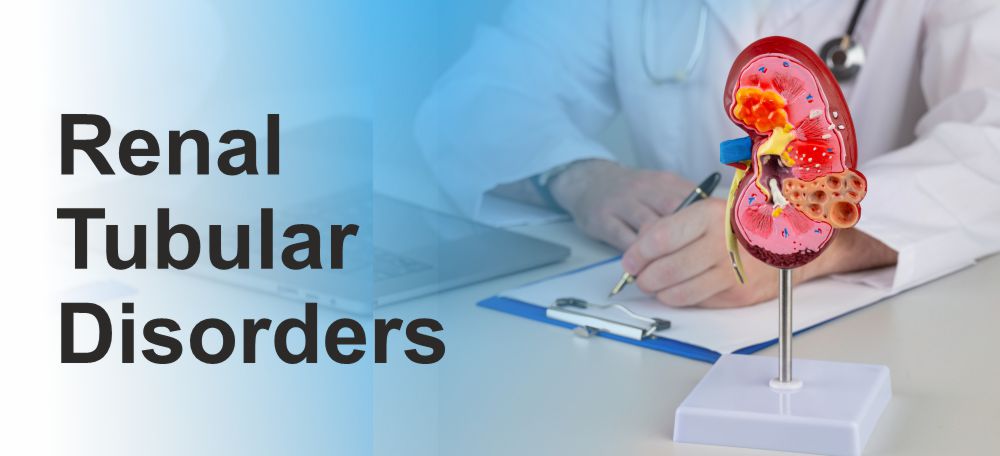Renal Tubular Disorders Overview
Renal tubular disorders are a group of kidney conditions affecting the renal tubules, which play a crucial role in filtering waste, maintaining electrolyte balance, and regulating acid-base levels in the body. These disorders can lead to electrolyte imbalances, dehydration, kidney stones, metabolic acidosis, and even chronic kidney disease (CKD).
Understanding Renal Tubular Disorders
The renal tubules are responsible for:
✔ Reabsorbing essential electrolytes (sodium, potassium, calcium, bicarbonate, phosphate)
✔ Maintaining the body’s pH balance
✔ Conserving water to prevent dehydration
When the renal tubules fail to function properly, it leads to electrolyte imbalances, acid-base disturbances, and progressive kidney damage.
Types of Renal Tubular Disorders & Their Symptoms
1. Renal Tubular Acidosis (RTA)
A condition where the kidneys fail to excrete acid properly, leading to metabolic acidosis and electrolyte imbalances.
🔹 Type 1 (Distal RTA): Affects acid secretion in the distal tubule. Causes severe acid buildup (acidosis), low potassium levels (hypokalemia), kidney stones, and bone disorders (osteomalacia).
🔹 Type 2 (Proximal RTA): Affects bicarbonate reabsorption in the proximal tubule. Leads to low blood bicarbonate levels, bone softening (rickets in children), and growth failure.
🔹 Type 4 RTA: Related to aldosterone deficiency or resistance. Leads to high potassium levels (hyperkalemia), acid buildup, and reduced sodium retention.
2. Bartter Syndrome
A rare genetic disorder affecting sodium, potassium, and chloride absorption in the kidneys.
✔ Causes severe dehydration, low blood pressure, muscle weakness, and electrolyte imbalances (hypokalemia, hypochloremia, metabolic alkalosis).
✔ Common symptoms: Frequent urination, salt cravings, muscle cramps, failure to thrive (in children).
3. Gitelman Syndrome
A milder variant of Bartter Syndrome, affecting sodium and chloride reabsorption in the distal tubule.
✔ Causes low potassium (hypokalemia), low magnesium (hypomagnesemia), and muscle spasms.
✔ Symptoms: Fatigue, muscle weakness, low blood pressure, excessive urination.
4. Fanconi Syndrome
A disorder affecting multiple tubular functions, leading to loss of essential nutrients in urine.
✔ Causes excessive loss of glucose, amino acids, phosphate, and bicarbonate in urine.
✔ Symptoms: Bone softening (rickets in children, osteomalacia in adults), excessive urination, dehydration, growth retardation.
5. Liddle Syndrome
A genetic condition where the kidneys reabsorb too much sodium, leading to high blood pressure (hypertension) and low potassium levels (hypokalemia).
✔ Symptoms: Early-onset hypertension, muscle weakness, fatigue, metabolic alkalosis.
✔ Treatment: Low-sodium diet, potassium-sparing diuretics (Amiloride, Triamterene).
6. Nephrogenic Diabetes Insipidus (NDI)
A disorder where the kidneys fail to respond to antidiuretic hormone (ADH), leading to excessive water loss in urine.
✔ Symptoms: Extreme thirst (polydipsia), excessive urination (polyuria), dehydration, electrolyte imbalances.
✔ Treatment: Hydration, thiazide diuretics, low-sodium diet.
Diagnosis of Renal Tubular Disorders
Dr. Suresh Chandra uses advanced diagnostic techniques to detect renal tubular disorders early and prevent complications.
✔ Blood Tests: Measure electrolyte levels (sodium, potassium, bicarbonate, calcium, phosphate).
✔ Urine Tests: Assess urine pH, protein levels, glucose, and electrolyte excretion.
✔ Genetic Testing: Identifies inherited renal tubular disorders (Bartter, Gitelman, Liddle Syndrome).
✔ Kidney Function Tests: Serum creatinine, eGFR (estimated glomerular filtration rate).
✔ Imaging: Kidney ultrasound, CT scan for structural abnormalities, kidney stones.
Treatment Approaches
Electrolyte Replacement Therapy – Corrects potassium, bicarbonate, calcium, and phosphate imbalances.
🔹 Alkalinizing Agents – Sodium bicarbonate, citrate solutions for renal tubular acidosis.
🔹 Diuretics – For Liddle Syndrome, Bartter & Gitelman Syndromes to regulate sodium & potassium levels.
🔹 Hormone Therapy – Desmopressin (DDAVP) for Nephrogenic Diabetes Insipidus.
🔹 Dietary Modifications – Low-sodium, potassium-rich diet, adequate hydration.
🔹 Bone Health Support – Vitamin D, phosphate supplements for Fanconi Syndrome & RTA.


